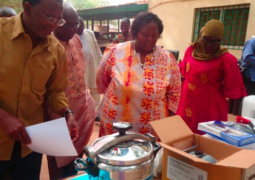
Legal and Economic Empowerment: an Important Dimension of Human Rights Education
Freedom is both the primary objective, and the principal means of development... What a person has the actual capability to achieve is influenced by economic opportunities, political liberties, social facilities, and the enabling conditions of good health, basic education, and the encouragement and cultivation of initiatives. These opportunities are, to a great extent, mutually complementary, and tend to reinforce one another.
Amartya Sen
In most of Africa the discourse of human rights and development has been dominated by political freedoms and power relations between the Governors and the Governed: how to seek and retain political power at all cost? What the role of governments are in the empowerment of citizens hardly ever gets discussed? And the economic aspects of freedom are regarded as esoteric subjects that only economists are fit to discuss. Economic freedom is a freedom that opens up opportunities, but also imposes disciplines; it is a freedom that creates capabilities, but expects stewardship; it is a freedom that rewards enterprise, but calls for accountability. It is a freedom we can and should use to build a new society, mould a new culture and create hope and opportunity for future generations.
However, economic freedom can only be exercised by empowered peoples. For this reason it may be useful to devote this piece to a definition of Legal empowerment: It means the use of law to empower the people, and it is at the intersection of the emerging nexus between law and socioeconomic development efforts that promote empowerment and rights -based approach to development.
On the other hand disempowerment is the combination of constraints that prevent the people from accessing the political, economic and legal systems and participating in governance, which thereby limit the enjoyment of human rights. Examples include:
1. lack of economic independence;
2. minimal understanding of the law and the rights that it confers;
3. limited access to affordable legal services;
4. lack of knowledge, incentives, and resources among government officials;
5. limitations in the outreach and capacity of civil society organizations to provide legal
services to the disadvantaged;
6. inconsistency between formal law and traditional values;
7. poorly drafted or contradictory laws and regulations;
8. failure to implement sound laws;
9. traditional use of law as an instrument of control (rule by law rather than rule of law);
10. corruption;
These constraints together give rise to a sense of learned helplessness among the people-a feeling of powerlessness among those whose experience leads them to conclude that traditional power relations invariably prevent them from asserting their rights or participating in public decision-making processes. Consequently, the people tend to view the role of governments in empowering them with skepticism or indifference.
Legal empowerment is both a process and a goal. As a process, it involves the use of law to increase the peoples' control over their lives through a combination of education and action. Such control may relate to such priorities as basic security, livelihood, access to essential resources, and participation in public decision-making processes. It reflects the increased knowledge, capacity, and confidence of the people, and the enhancement of their ability to work together to advance common development objectives. As a goal, legal empowerment refers to the actual achievement by the people of increased control over their lives through the use of law. The distinction is important, because the process of legal empowerment can proceed even if the goal has yet to be achieved.
Legal empowerment helps to impart critical consciousness-the ability of ordinary people, to understand and think critically about the inequitable power relationships that affect their lives, and to take action to challenge and transform those relationships. Legal empowerment differs from other forms of empowerment in that it involves the explicit or implicit use of the law through training, counseling, litigation, and representation in administrative procedures, advocacy before government agencies, or other interventions. These activities may also be combined with initiatives that are not inherently law-oriented, such as NGO, Civil Society organizing or livelihood development.
Legal empowerment can involve both education and action. Most advanced legal empowerment initiatives go beyond simply educating people. They provide the people with opportunities to apply the knowledge or skills imparted to advance their legal interests, including taking action that secures or enforces their rights and improves their well being.
Legal empowerment is not the same as promoting the rule of law, although the two frequently overlap. Efforts to promote the rule of law have traditionally tended to focus on judiciaries and other formal legal institutions and actors. These efforts aim to strengthen and reform legal institutions and systems so that they operate fairly, efficiently, and free of interference by the State or powerful private interests. In some cases, rule of law initiatives involve and indirectly benefit the people.
In contrast, while legal empowerment has clear rule of law implications, its processes and goals focus directly on the circumstances and needs of ordinary people. It concerns how the law can be used to benefit them in a broad array of development fields that may not have a strict legal dimension, including education, public health promotion, agriculture, and natural resource management. Legal empowerment thus bridges a gap between the rule of law and socioeconomic development, integrating the rule of law to meet priorities in other development fields.
Legal empowerment contributes to institutional reform by mobilizing public interests and expectations that are often neglected by more narrowly focused efforts to strengthen formal institutions. Institutions generally, and legal and bureaucratic institutions in particular, tend to resist change. While legal institutions have come under increasing pressure from domestic reformers and the international community, they continue to operate with minimal sense of accountability to, or pressure from, the general public, much less from disadvantaged groups.
In its most sophisticated forms, legal empowerment adds a participatory dimension to institutional development. As their knowledge, capacity, and confidence grow, the people are able to more capably and confidently engage in public decision-making processes. They gain greater control over their lives by learning how to effectively interact with a range of institutions, creating opportunities to participate in public decision making rather than waiting for opportunities to be extended to them. Public participation adds further pressure to institutional reform efforts, challenging legal and other institutions to infuse development content in their regulatory role. While there is clear value in the role of legal empowerment in assisting individual citizens to resolve specific problems, its equally great contribution lies in the higher level institutional and procedural reforms and changes in the political dynamics of decision making to which it contributes by mobilizing collective capacity and demand.
Legal empowerment equips the people to more effectively advance their interests through engagement with the legal system, public agencies, civil society, private parties, and economic development efforts. It may also increase the benefits that the people enjoy as participants in development projects. The success of development projects depends largely on two indices: first, that public institutions and officials responsibly exercise legal powers that affect the rights and interests of project beneficiaries; second, that opportunities are created for beneficiaries to advance their rights and interests through informed participation in project-related, decision-making processes.
Economic development, in a nutshell, is about increasing the level of competency and effectiveness of institutions and the people who run those institutions must be empowered otherwise they will run them down. The successful societies of Asia have managed within a generation to enlarge the economic freedoms of their people, achieve unprecedented levels of prosperity and have quietly change architecture of global economic relations. Africans should learn from their examples and commit to building cohesive, inclusive and empowered communities.



